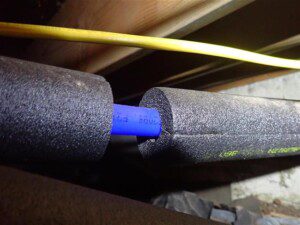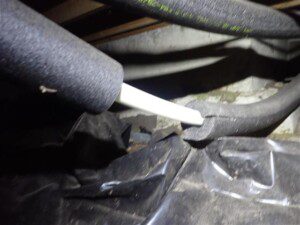Insulating water pipes is an easy and inexpensive way to improve your home and reduce your energy costs. It can often be accomplished in a single day by the average homeowner.

Water pipe insulation can also help prevent potentially catastrophic water damage. During the cold season, water pipes that are not insulated can freeze which can cause the pipes to burst. Because water lines are under pressure at all times, burst water pipes can very quickly cause significant property damage. Water damage accounts for about one third of all homeowner’s insurance claims. Insulating pipes greatly reduces the risk of property damage due to frozen pipes.
Water pipe insulation is inexpensive and is readily available at all home improvement stores. It can also be purchased online. The most common type of insulation is a foam that is slit down the middle and that has an adhesive strip at the slit. The insulation should be cut down to the needed length and then installed around the pipe. The adhesive strip glues the insulation together and the pipe is insulated.

You should check the condition of the pipes as you are insulating them. If your home has galvanized metal pipes that are showing signs of significant corrosion, we recommend having the pipes evaluated by a plumber. Some galvanized plumbing is in a condition that warrants replacement and it may not make sense to put in the effort of insulating pipes that need to be replaced.
